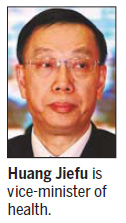Organ donor regulations to be revised
The amendment of China's organ transplant regulations is being prepared and may be out in March after revision, said Vice-Health Minister Huang Jiefu.
"It will give legal footing to the Red Cross Society of China to set up and run China's organ donation system," he told China Daily.

The organ transplant regulations that the amendment will update have been in use since 2007.
"With the amendment, China will be a step closer to building up a national organ donation system, which is being run as a pilot project in 11 provinces and regions now, and thus ensure the sustainable and healthy development of organ transplants and save more lives," he said.
The Red Cross Society's responsibilities will include encouraging posthumous voluntary organ donations, establishing a list of would-be donors and drawing up registers of people waiting for a suitable donated organ.
The long-awaited system will be available to everyone in China (excluding prisoners) wanting to donate their organs after their death in the hope of saving lives.
Currently, about 10,000 organ transplants are carried out each year on the Chinese mainland. It is estimated that around 1.3 million people are waiting for a transplant.
However, there had been a lack of a State-level organ donor system before a trial project was launched in March 2010. Currently, organ donations have come mainly from volunteers and executed
prisoners with written consent either from themselves or family members. The process has been put under strict scrutiny from the judicial department, according to the Ministry of Health.
"An ethically proper source of organs for China's transplants that is sustainable and healthy would benefit more patients," Huang said.
He said a trial project run by the Red Cross Society and the Ministry of Health, which was started last March in 11 regions, has led to 30 free and voluntary organ donations.
"As the pilot gradually expands nationwide, more people will be willing to donate in China."
He said willing organ donors, who die in traffic accidents or because of conditions such as a stroke will be the most suitable.
Huang stressed that a compensatory aid program for organ donations will also be necessary and he suggested that donors' medical bills and burial fees should be covered and a tax deduction offered, rather than a fixed cash sum paid.
Luo Gangqiang, a division director in charge of organ donation work with the Red Cross Society in Wuhan - one of the 11 trial regions - said cash compensation in some areas has prompted potential donors to shop around when deciding whether to donate.
"Few details concerning the system have been fixed so far," he told China Daily.
Luo noted that his region is currently offering donors 10,000 yuan ($1,500) in compensation, which is less than the amount on offer in Shenzhen, another area participating in the pilot project.
He said the money is mainly from hospitals receiving the organs.
In other words, "it's finally from the recipients", he said.
Many of the pilot areas are trying to set up special funds mainly to compensate donors in various forms, according to Luo.
"Donations from transplant hospitals, recipients, corporations and the general public are welcome."
The money will also be used to support the work of coordinators, mainly nurses working in ICUs, he noted.
Luo also pointed out a pressing need for brain death legislation to be brought in to help their work. Worldwide more than 90 countries take brain death as the diagnostic criterion to declare death.
Given the limited understanding among the public and even some medical workers about when brain death happens and when cardiac arrest happens coupled with various social and cultural barriers to removing organs, "legislation on brain death won't come shortly", Huang said.
For the official standard, "we should advise cardiac death at present as a death standard for donations", he said.
But he also suggested that cardiac death and brain death could coexist and that Chinese people could be allowed to choose which one they want as the criterion for their own donations, based on individual circumstances and free will.
"The health ministry will promote brain death criterion at the appropriate time, when people can understand concepts such as brain death, euthanasia, and vegetative states," he said.
Meanwhile, efforts are under way including organizing training, publishing technical diagnostic criteria and operational specifications on brain death among doctors to enhance their awareness.
So far, China has an expert team of more than 100 people capable of handling brain death related issues, Huang noted.
 0
0 






